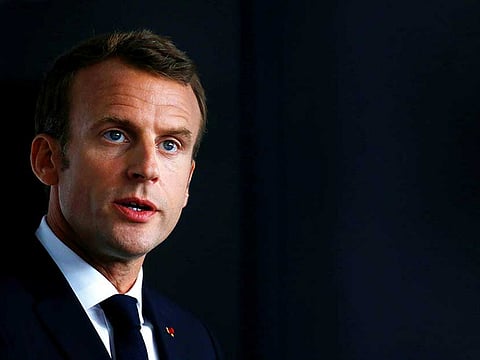Why Macron is no ‘Mr Cool’
French president tore into a teenager who called him with a common nickname during an event at a Second World War memorial

Emmanuel Macron has been called many things. To the French media, he is sometimes “Jupiter” or “Napoleon”; to his opponents, he is the “president of the rich”, after his liberal policies that tend not to favour the poor. But he would like to be called “Mr President”.
At the annual commemoration of Charles de Gaulle’s 1940 appeal to the French resistance last Monday, Macron served a daring teenager who made the mistake of greeting him with a “How’s it going, Manu?” with a severe dressing-down.
Macron told the red-faced teen that “Manu”, a popular nickname for Emmanuel, is not an acceptable way to address the president during an official event. “No, you can’t do that, no, no, no, no. You’re here, at an official ceremony and you should behave. You can play the fool, but today it’s the Marseillaise, the Chant des Partisans [a French Resistance song], so you call me ‘Mr President’ or ‘Sir.’”
The young man, who was attending the event at Mont-Valerien near Paris — a fort where members of the resistance were executed during the Second World War — had sung the beginning to L’Internationale, using the socialist anthem as an ironic reference to Macron’s liberal reforms of the French labour market. The president, speaking in a sharp, angry tone, continued: “You must do things in the right order. The day you want to start a revolution, you first obtain a degree and learn how to feed yourself, OK? Then you can lecture others.”
The video of their exchange was then posted on Mr President’s Twitter account, with the caption: “Respect is a minimum in the republic.” It quickly went viral, and the whole world witnessed France’s president publicly humiliating a teenager.
But does Macron really hate nicknames or informality? Mr President can be very familiar with his staff: They affectionately call him “le boss”. He says “tu”, the informal French “you” to many politicians, including Russian President Vladimir Putin. As a young minister, Macron would start texts to colleagues with the catchphrase: “Salut ma poule, c’est Manu” (“Hey, love, it’s Manu”). The teenager’s dressing-down comes as the president himself has been criticised for using insensitive language.
In the past, he has called abattoir workers “illiterate”, protesters against his labour law reforms “slackers”, and has said that employees fired from a company should look for a job instead of “wreaking havoc” (“foutre le bordel”, a coarse expression best translated as “making a f*** mess”). Just last week, he was filmed complaining that the French welfare state costs a “crazy amount of dough”. Macron campaigned on a young and ostensibly “cool” platform — his team, full of 20-somethings, ruled social media and were all fluent in English.
Now, as President, Macron has cut housing aid for students, made university selective and lectured youngsters on how to address him. The teen, who was attending with his friends, was breezy and provocative.
But he is just a child — a child who looked genuinely excited to meet the president, who was both daring and politically aware enough to sing L’Internationale at his own country’s leader, and who is now ashamed and avoiding school because all the other children are making fun of the video. If anything, after grand speeches about how French youth is the future, Macron should have praised his bravado. Instead, his reply sounded childish, too.
It’s especially tone-deaf because “Manu” is a positive nickname. It’s shorthand for the nice kid, or the friendly, guitar-playing camp counsellor — someone young, someone cool, someone who gets it, man. In fiction and popular culture, “Manu” is always the best friend — from children’s comic character Titeuf to the eponymous 1980s song, An ode to Friendship by singer Renaud. A teenager calling Macron “Manu” doesn’t constitute disrespect: His warm casualness conveys affection, it addresses the president’s most “normal” side. Maybe that is why Macron, who has worked hard to break from his predecessor, “normal president” Francois Hollande, didn’t appreciate the banter.
Mr President’s harsh words have made one thing very clear: He is not so cool after all.
— Guardian News & Media Ltd
Pauline Bock is a French journalist based in Britain. She writes for the New Statesman.
Sign up for the Daily Briefing
Get the latest news and updates straight to your inbox



